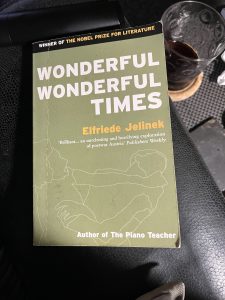Without Waking Up by Carolina Schutti
Austrian fiction
Original title –Einmal muss ich über weiches Gras gelaufen sein
Translator Deidre McMahon
Source – Review copy
I love it when new publishers reach out for me to review books in translation and it is great when they are outside the uk like Bullion Press the Irish-based press. Asked me to review this Austrian novel from the writer Carolina Schutti I said yes it had won the EU literature prize, a prize from which I have read a few books over the year. This book’s German title also grabbed me it is in English I must have walked on soft grass once. I love the enigmatic nature of that Schutti got a doctorate on b the work of Elias Canetti and has written a number of novels and poetry works. This is her first book to be translated into English.
There are various Babushkas. Some resemble each other down to the finest details and some have different pictures on their fronts. A different picture on every front and you know immediately which story belongs to it. And the big Babushka holds all the stories together like the cover of a book of fairy tales. You need to study the smallest picture especially carefully because if you are lucky, even this tiny surface has a background showing a forest or a stream or flowers. I was lucky. My Babushka was particularly beautiful. I can remember every picture and I still know the stories that went with the pictures; they translated themselves without me noticing.
Marek often asked me to tell him these stories. I thought that maybe they reminded him of the stories of his childhood, because they were similar, but perhaps he only wanted to prevent them fading from my memory.
The various woman through her life she had called that name.
The book focuses on a little girl Maja over a number of years we get fragments of her life. She is now living in Austria having come there from Belarus. Hence when the book opens she refers to a distant Austrian aunt by the Russian term Babushka. But that is also a hint at the book nature as it is about a woman that Maja had called through the years it is a doll-in-doll nature to the book as we go further in Maja’s life. this is a woman looking back at the fragmented memories of her youth a broken youth that maybe is reflected in her present her only childhood connection to a Polish man Marek and maybe in his life stories is that shared sense of loss of place that she feels and how her loss of identity when she lost her mother tongue. The past is a lost country is the opening line of the go-between another story of youth and jagged memories and the past is post definitely another country and life.
She can remember every bird and every stray thread of that tablecloth. But Marek’s face. The birthmark on his chin, the grey hair that was always a little too long on his neck, his dark incisor-tooth, the light-brown spots in his eyes, the face on the photograph she took out of the envelope. Fifty-fifty, the letters in white touch-up pen raised off the paper. Maja sees the face in the photo, she only ever sees that photograph face, as if she had never known any other.
I’m always amazed at what we remember in the past I remember photos of the past and they differ from my memory
I love books with fragment memories of how the mind plays with our thoughts of the past and it has always made for great literature from Proust biting into that Madelaine or the first line of L P Harley’s go between this is a book about Maja trying to piece those remembered fragments of the Babushka’s she had seen. I was reminded of last year at Marianbad where the idea of a past was now distorted and faded and forgotten that is the case her heritage is fragments of a lost connection to a Polish man her aunt didn’t like as I said the original title has a certain enigmatic nature to it and this novel does it is a series of memories stacked like the Russian dolls on the cover of the book but maybe like peeling the layer of an onion back the tears are here to be seen and the sorrow of that past but maybe also the ripples in Maja’s present life and situation/ This would be the sort of book you’d like if you have enjoyed the early books from Peirene press it would have sat with them well. I’ll end with another quote and this is one of my favourite Counting Crows songs but this book is like this too.”If dreams are like movies, the memories are films about ghosts.
Winston’s score – I am a sucker for fragments of a life in a novella so
this gets an +A from me











